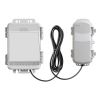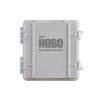HOBOnet Wireless T11 Soil Moisture/Temp Sensor
Features
- 900 MHz wireless mesh self-healing technology
- 450 to 600 meter (1,500 to 2,000 feet) wireless range and up to five hops
- Up to 50 wireless sensors or 336 data channels per HOBO RX station
- Free ground shipping
- Expedited repair and warranty service
- Lifetime technical support
- More
Overview
The Onset HOBOnet T11 is a wireless sensor that works with the HOBOnet system to accurately and precisely measure soil moisture (volumetric water content) and soil temperature.
Design
Designed to withstand harsh environmental conditions, these durable sensors last up to 10 years for extended deployments. Sharpened stainless-steel probes make installation easy, even in hard soil, and a large volume of influence provides better results and a more accurate view of soil moisture. The HOBOnet T11 is backed by over 20 years of soil-moisture research and features a trademark 70MHz frequency capacitance technology, minimizing salinity and textural effects.
Applications
The HOBOnet system is a cost-effective and scalable wireless sensor network for web-enabled monitoring of field conditions for applications such as crop management, research, and greenhouse operations. The wireless design allows users to deploy a network of sensors to easily monitor multiple points with a single system while avoiding the risk of long cables that can interfere with field operations and are potentially vulnerable to nearby lightning strikes. Sensors are easily linked to the network, and data can be accessed through HOBOlink, Onset's innovative cloud-based software platform.
Verification Clip
The optional Verification Clip provides a convenient way to confirm the operation and soil moisture accuracy of HOBOnet T11 and T12 sensors. Attaching this clip to a sensor provides a known soil moisture level for verifying measurement accuracy, without having to test the sensor in actual soils, which normally requires weighing soil samples and drying them in an oven.
In The News
From Paddles to Phytoplankton: Studying Vermont’s Wildest Lakes
For six months of the year, Rachel Cray, a third-year PhD student at the Vermont Limnology Laboratory at the University of Vermont, lives between a microscope and her laptop, running data. For the other six months, she is hiking and canoeing four of Vermont’s lakes, collecting bi-weekly water samples. Cray studies algal phenology across four lakes in Vermont, US, that have low anthropogenic stress—or in other words, are very remote. Funded by the National Science Foundation Career Award to Dr. Mindy Morales, the lakes Cray researches part of the Vermont Sentinel Lakes Program, which studies 13 lakes in the area and, in turn, feeds into the Regional Monitoring Network, which operates in the Northeast and Midwest US.
Read MoreReimagining Water Filtration: How Monitoring and Science Enhance FloWater Filtration Systems
Over 50% of Americans think their tap water is unsafe , according to the Environmental Working Group (EWG). Other recent surveys have found that number to be as high as 70% of persons surveyed. Whether due to increased public awareness of water quality issues or confusion about how municipal water sources are regulated, there is a clear distrust of tap water in the United States. According to industry expert Rich Razgaitis, CEO and co-founder of the water purification company FloWater, this issue creates a damaging cycle. Razgaitis explained that the health and environmental problems associated with contaminated water aren’t the only issues. As people become increasingly aware that some tap water is unsafe, they resort to bottled water.
Read MoreMonitoring New Hampshire’s Aquatic Ecosystems: Continuous Data Collection in the Lamprey River Watershed
New Hampshire’s aquatic ecosystems provide a range of ecosystem services to the state and region. Resources and services like clean water, carbon storage, climate regulation, nutrient regulation, and opportunities for recreation all depend on New Hampshire’s aquatic ecosystems remaining healthy. Jody Potter, an analytical instrumentation scientist at the University of New Hampshire (UNH), is studying these aquatic ecosystems in hopes of developing an improved understanding of ecosystem services and their interactions with climate change, climate variability, and land use changes. [caption id="attachment_39799" align="alignnone" width="940"] Aquatic sensors in the Merrimack River in Bedford, NH, with I-293 in the background.
Read More














